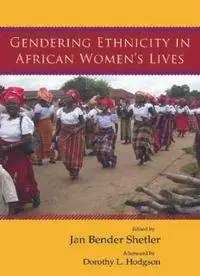
Gendering Ethnicity in African Women’s Lives PDF
Preview Gendering Ethnicity in African Women’s Lives
UWP: Shetler: Gendering Ethnicity in African Women’s Lives pagei Gendering Ethnicity in African Women’s Lives UWP: Shetler: Gendering Ethnicity in African Women’s Lives pageii w o m e n i n a f r i c a a n d t h e d i a s p o r a Ser ies Edi tors stanl ie james aili mari tripp UWP: Shetler: Gendering Ethnicity in African Women’s Lives pageiii Gendering Ethnicity in African Women’s Lives Edited by Jan Bender Shetler t h e u n i v e r s i t y o f w i s c o n s i n p r e s s UWP: Shetler: Gendering Ethnicity in African Women’s Lives pageiv Publication of this volume has been made possible, in part, through the generous support of retired Goshen College history professor James Hertzler and his wife, Diane. The University of Wisconsin Press 1930 Monroe Street, 3rd Floor Madison, Wisconsin 53711-2059 uwpress.wisc.edu 3 Henrietta Street, Covent Garden London WC2E 8LU, United Kingdom eurospanbookstore.com Copyright © 2015 The Board of Regents of the University of Wisconsin System All rights reserved. Except in the case of brief quotations embedded in critical articles and reviews, no part of this publication may be reproduced, stored in a retrieval system, transmitted in any format or by any means—digital, electronic, mechanical, photocopying, recording, or otherwise— or conveyed via the Internet or a website without written permission of the University of Wisconsin Press. Rights inquiries should be directed to UWP: Shetler: Gendering Ethnicity in African Women’s Lives pagev Contents Acknowledgments ix Introduction: Women’s Alternative Practices of Ethnicity in Africa 3 jan bender shetler Part I Forming Interethnic Alliances 1 Gendering the History of Social Memory in the Mara Region, Tanzania, as an Antidote to “Tribal” History 31 jan bender shetler 2 Living Ethnicity: Gender, Livelihood, and Ethnic Identity in Mozambique 57 heidi gengenbach Part II Constructing New Forms of Identity 3 Re-reading the 1835 “Fingo Emancipation”: Women and Ethnicity in the Colonial Archive 87 poppy fry 4 New African Marriage and Panethnic Politics in Segregationist South Africa 100 meghan healy-clancy v UWP: Shetler: Gendering Ethnicity in African Women’s Lives pagevi vi Contents 5 Women and Non-ethnic Politics in East Africa, 1934–1947 123 ethan r. sanders Part III Promoting Gendered Domains of Ethnicity 6 Gender and the Limits of “Ndebeleness,” 1910–1960s: Abezansi Churchwomen’s Domestic and Associational Alliances 153 wendy urban-mead 7 “Women Were Not Supposed to Fight”: The Gendered Uses of Martial and Moral Zuluness during uDlame, 1990–1994 178 jill e. kelly 8 Sorting and Suffering: Social Classification in Postgenocide Rwanda 206 jennie e. burnet Part IV Performing Gendered Ethnic Power 9 Matriliny, Masculinity, and Contested Gendered Definitions of Ethnic Identity and Power in Nineteenth-Century Southeastern Nigeria 233 ndubueze l. mbah 10 Shaming Men, Performing Power: Female Authority in Zimbabwe and Tanzania on the Eve of Colonial Rule 265 heike i. schmidt 11 Muslim Women Legislators in Postcolonial Kenya: Between Gender, Ethnicity, and Religion 290 ousseina d. alidou Afterword: Reflections on Gender, Ethnicity, and Power 309 dorothy l. hodgson one line long UWP: Shetler: Gendering Ethnicity in African Women’s Lives pagevii Contents vii Suggestions for Further Reading 315 Contributors 323 Index 327 UWP: Shetler: Gendering Ethnicity in African Women’s Lives pageviii blank UWP: Shetler: Gendering Ethnicity in African Women’s Lives pageix Acknowledgments Thanks to the editors and readers at the University of Wisconsin Press for their helpful insights and suggestions and for their conviction that we could make a signifcant contribution to scholarship. We owe special thanks to Aili Tripp for seeing the importance of this topic at the frst African Studies Association panel in 2010 and to Stanlie James, the series coeditor, as well as Gwen Walker and the great staff at the press. Thanks to Lauren Stoltzfus, a recent Goshen College graduate, who did much of the frst round of editing, helping us to see how an undergraduate might experience our writing and showing amazing ability at a young age. Thanks to Goshen College for the grant money to do much of the editing and preparation work. Thanks to Dorothy Hodgson for providing guidance and support throughout the process, as well as insightful comments on drafts. Chapter 4, “New African Marriage and Panethnic Politics in Segregationist South Africa” by Meghan Healy-Clancy, has been adapted from Meghan Healy-Clancy, “The Politics of New African Marriage in Segregationist South Africa,” African Studies Review 57, no. 1 (April 2014), copyright © 2014 by African Studies Association. Reprinted with the permission of Cambridge University Press. Chapter 8, “Sorting and Suffering: Social Classifcation in Postgenocide Rwanda” by Jennie E. Burnet, has been adapted from Jennie E. Burnet, Genocide Lives in Us: Women, Memory, and Silence in Rwanda, copyright © 2012 by the University of Wisconsin Press. Reprinted with the permission of the University of Wisconsin Press. Chapter 11, “Muslim Women Legislators in Postcolonial Kenya: Between Gender, Ethnicity, and Religion “ by Ousseina D. Alidou, has been adapted from Ousseina D. Alidou, Muslim Women in Postcolonial Kenya: Leadership, Representation, and Social Change, copyright © 2013 by the University of Wiscon- sin Press. Reprinted with the permission of the University of Wisconsin Press. ix
